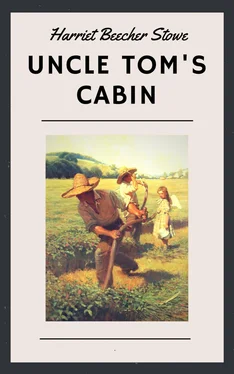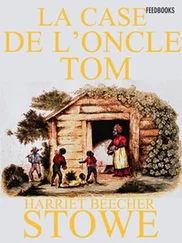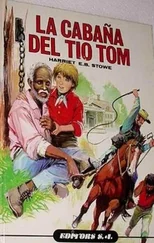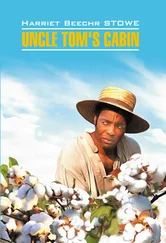“And do you find your ways of managing do the business better than Tom’s?” said Mr. Shelby.
“Why, yes, sir, I may say so. You see, when I any ways can, I takes a leetle care about the onpleasant parts, like selling young uns and that,—get the gals out of the way—out of sight, out of mind, you know,—and when it’s clean done, and can’t be helped, they naturally gets used to it. ’Tan’t, you know, as if it was white folks, that’s brought up in the way of ’spectin’ to keep their children and wives, and all that. Niggers, you know, that’s fetched up properly, ha’n’t no kind of ’spectations of no kind; so all these things comes easier.”
“I’m afraid mine are not properly brought up, then,” said Mr. Shelby.
“S’pose not; you Kentucky folks spile your niggers. You mean well by ’em, but ’tan’t no real kindness, arter all. Now, a nigger, you see, what’s got to be hacked and tumbled round the world, and sold to Tom, and Dick, and the Lord knows who, ’tan’t no kindness to be givin’ on him notions and expectations, and bringin’ on him up too well, for the rough and tumble comes all the harder on him arter. Now, I venture to say, your niggers would be quite chop-fallen in a place where some of your plantation niggers would be singing and whooping like all possessed. Every man, you know, Mr. Shelby, naturally thinks well of his own ways; and I think I treat niggers just about as well as it’s ever worth while to treat ’em.”
“It’s a happy thing to be satisfied,” said Mr. Shelby, with a slight shrug, and some perceptible feelings of a disagreeable nature.
“Well,” said Haley, after they had both silently picked their nuts for a season, “what do you say?”
“I’ll think the matter over, and talk with my wife,” said Mr. Shelby. “Meantime, Haley, if you want the matter carried on in the quiet way you speak of, you’d best not let your business in this neighborhood be known. It will get out among my boys, and it will not be a particularly quiet business getting away any of my fellows, if they know it, I’ll promise you.”
“O! certainly, by all means, mum! of course. But I’ll tell you. I’m in a devil of a hurry, and shall want to know, as soon as possible, what I may depend on,” said he, rising and putting on his overcoat.
“Well, call up this evening, between six and seven, and you shall have my answer,” said Mr. Shelby, and the trader bowed himself out of the apartment.
“I’d like to have been able to kick the fellow down the steps,” said he to himself, as he saw the door fairly closed, “with his impudent assurance; but he knows how much he has me at advantage. If anybody had ever said to me that I should sell Tom down south to one of those rascally traders, I should have said, ’Is thy servant a dog, that he should do this thing?’ And now it must come, for aught I see. And Eliza’s child, too! I know that I shall have some fuss with wife about that; and, for that matter, about Tom, too. So much for being in debt,—heigho! The fellow sees his advantage, and means to push it.”
Perhaps the mildest form of the system of slavery is to be seen in the State of Kentucky. The general prevalence of agricultural pursuits of a quiet and gradual nature, not requiring those periodic seasons of hurry and pressure that are called for in the business of more southern districts, makes the task of the negro a more healthful and reasonable one; while the master, content with a more gradual style of acquisition, has not those temptations to hardheartedness which always overcome frail human nature when the prospect of sudden and rapid gain is weighed in the balance, with no heavier counterpoise than the interests of the helpless and unprotected.
Whoever visits some estates there, and witnesses the good-humored indulgence of some masters and mistresses, and the affectionate loyalty of some slaves, might be tempted to dream the oft-fabled poetic legend of a patriarchal institution, and all that; but over and above the scene there broods a portentous shadow—the shadow of law . So long as the law considers all these human beings, with beating hearts and living affections, only as so many things belonging to a master,—so long as the failure, or misfortune, or imprudence, or death of the kindest owner, may cause them any day to exchange a life of kind protection and indulgence for one of hopeless misery and toil,—so long it is impossible to make anything beautiful or desirable in the best regulated administration of slavery.
Mr. Shelby was a fair average kind of man, good-natured and kindly, and disposed to easy indulgence of those around him, and there had never been a lack of anything which might contribute to the physical comfort of the negroes on his estate. He had, however, speculated largely and quite loosely; had involved himself deeply, and his notes to a large amount had come into the hands of Haley; and this small piece of information is the key to the preceding conversation.
Now, it had so happened that, in approaching the door, Eliza had caught enough of the conversation to know that a trader was making offers to her master for somebody.
She would gladly have stopped at the door to listen, as she came out; but her mistress just then calling, she was obliged to hasten away.
Still she thought she heard the trader make an offer for her boy;—could she be mistaken? Her heart swelled and throbbed, and she involuntarily strained him so tight that the little fellow looked up into her face in astonishment.
“Eliza, girl, what ails you today?” said her mistress, when Eliza had upset the wash-pitcher, knocked down the workstand, and finally was abstractedly offering her mistress a long nightgown in place of the silk dress she had ordered her to bring from the wardrobe.
Eliza started. “O, missis!” she said, raising her eyes; then, bursting into tears, she sat down in a chair, and began sobbing.
“Why, Eliza child, what ails you?” said her mistress.
“O! missis, missis,” said Eliza, “there’s been a trader talking with master in the parlor! I heard him.”
“Well, silly child, suppose there has.”
“O, missis, do you suppose mas’r would sell my Harry?” And the poor creature threw herself into a chair, and sobbed convulsively.
“Sell him! No, you foolish girl! You know your master never deals with those southern traders, and never means to sell any of his servants, as long as they behave well. Why, you silly child, who do you think would want to buy your Harry? Do you think all the world are set on him as you are, you goosie? Come, cheer up, and hook my dress. There now, put my back hair up in that pretty braid you learnt the other day, and don’t go listening at doors any more.”
“Well, but, missis, you never would give your consent—to—to—”
“Nonsense, child! to be sure, I shouldn’t. What do you talk so for? I would as soon have one of my own children sold. But really, Eliza, you are getting altogether too proud of that little fellow. A man can’t put his nose into the door, but you think he must be coming to buy him.”
Reassured by her mistress’ confident tone, Eliza proceeded nimbly and adroitly with her toilet, laughing at her own fears, as she proceeded.
Mrs. Shelby was a woman of high class, both intellectually and morally. To that natural magnanimity and generosity of mind which one often marks as characteristic of the women of Kentucky, she added high moral and religious sensibility and principle, carried out with great energy and ability into practical results. Her husband, who made no professions to any particular religious character, nevertheless reverenced and respected the consistency of hers, and stood, perhaps, a little in awe of her opinion. Certain it was that he gave her unlimited scope in all her benevolent efforts for the comfort, instruction, and improvement of her servants, though he never took any decided part in them himself. In fact, if not exactly a believer in the doctrine of the efficiency of the extra good works of saints, he really seemed somehow or other to fancy that his wife had piety and benevolence enough for two—to indulge a shadowy expectation of getting into heaven through her superabundance of qualities to which he made no particular pretension.
Читать дальше












